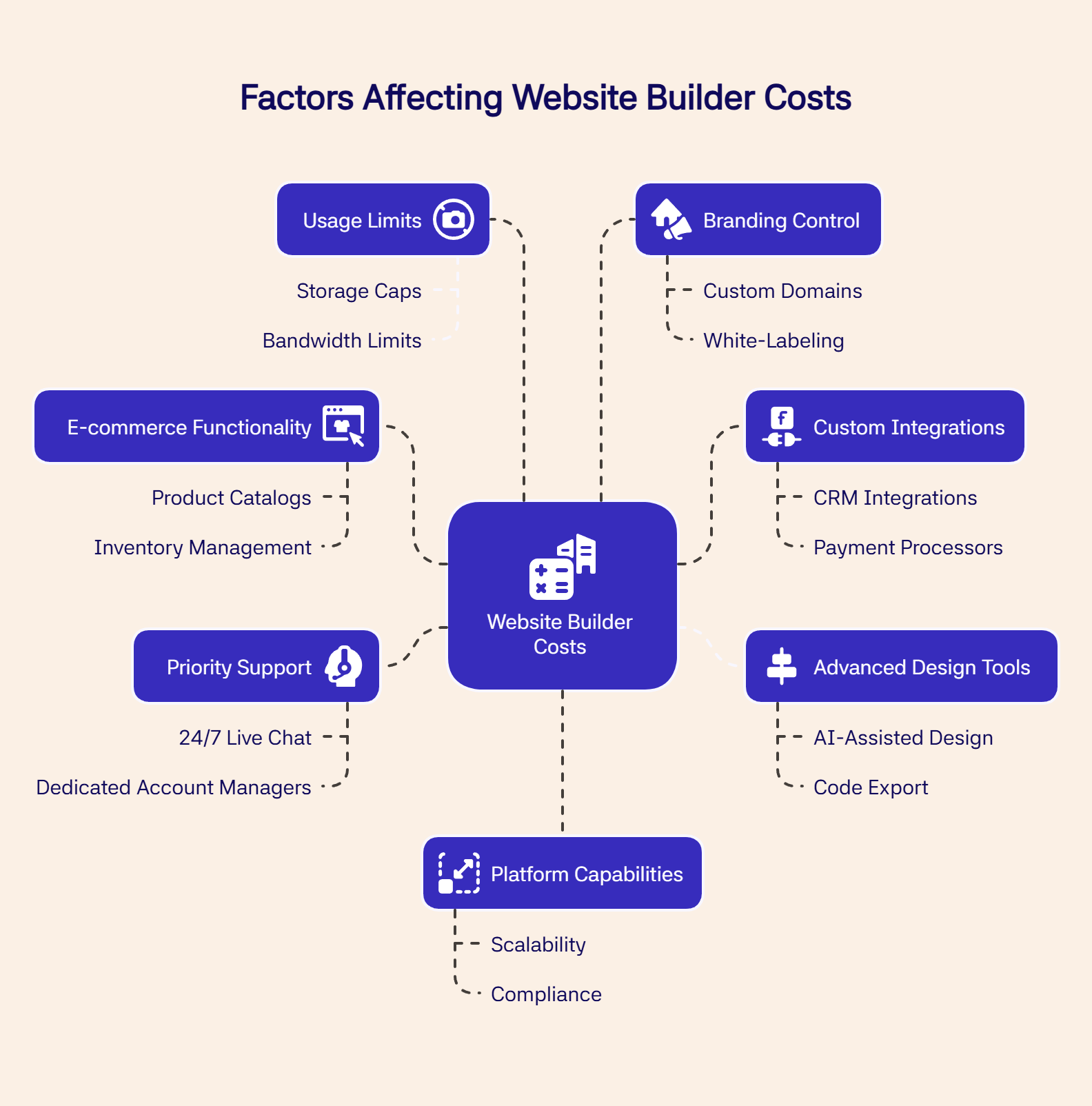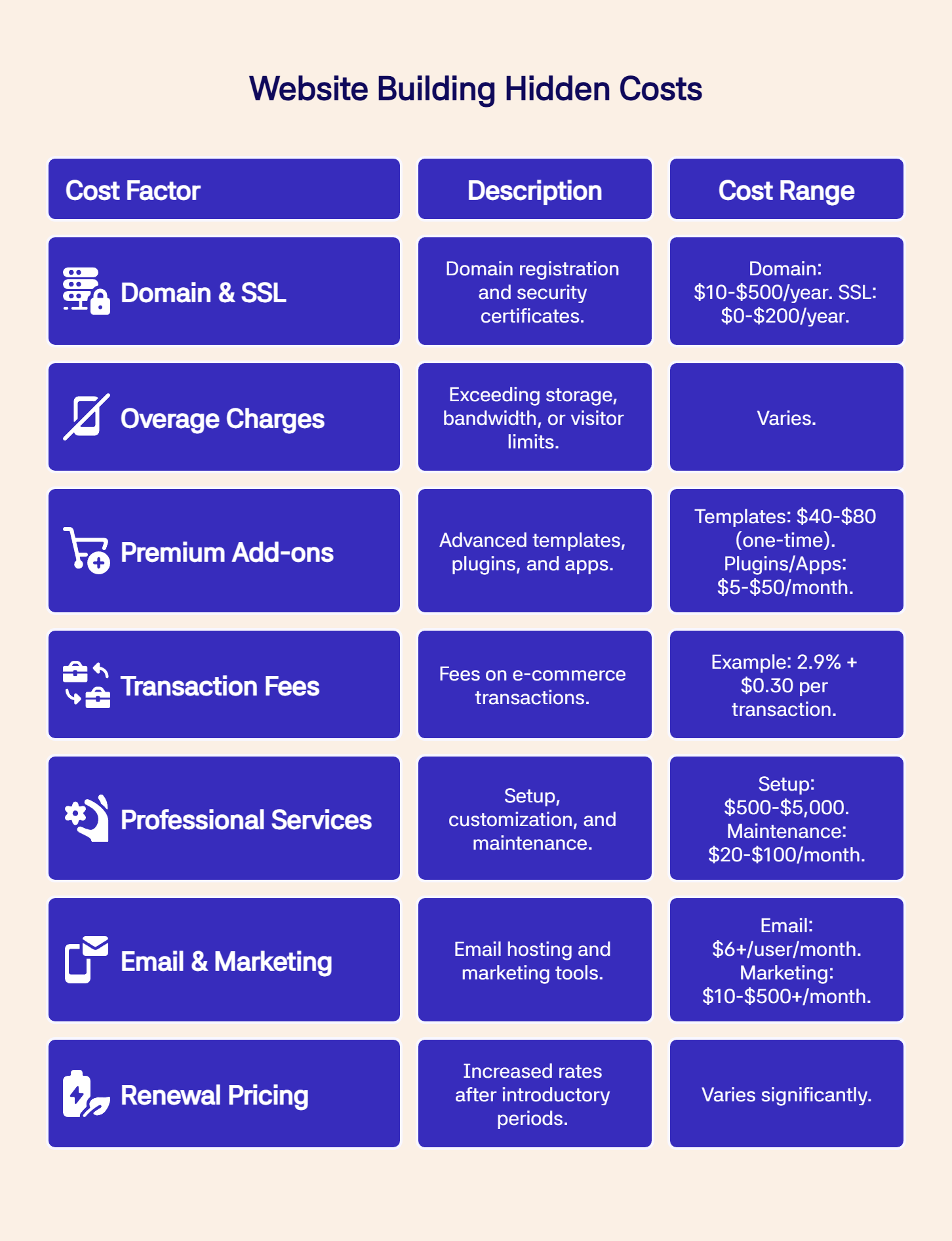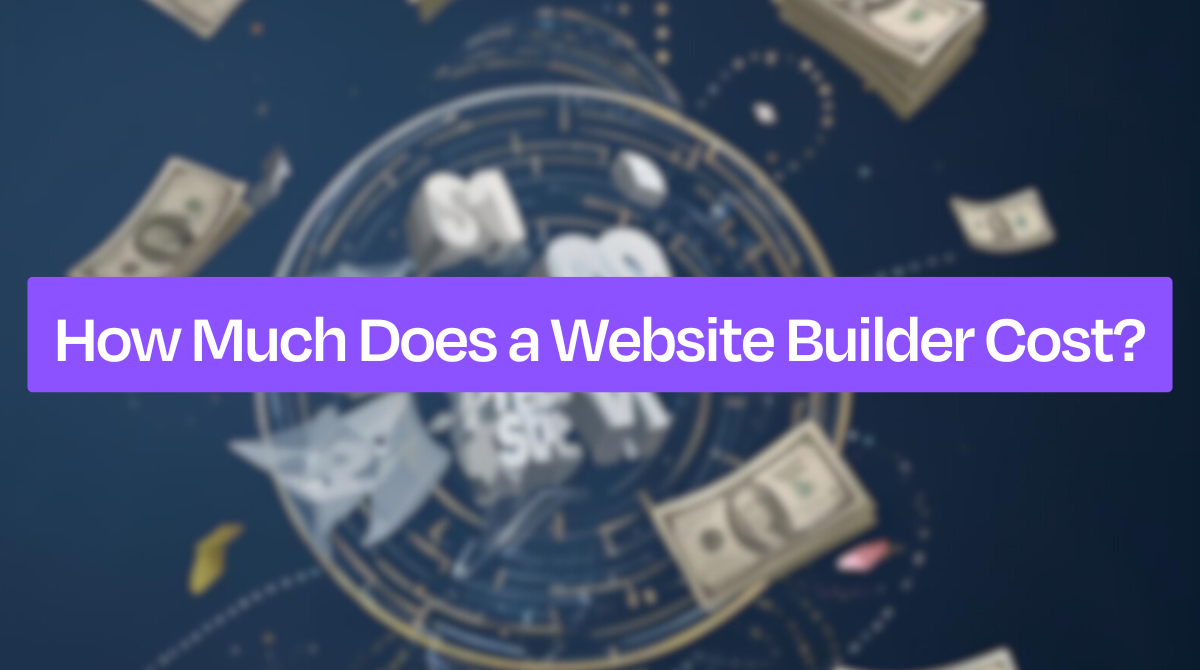Website builders typically cost $4-$159+ monthly, depending on the platform, pricing tier, and the features you choose. Free plans limit functionality, while paid plans ($3-$500/month) provide custom domains, storage, and e-commerce tools. Enterprise solutions like Shopify Plus start at $2,300/month.
This guide covers subscription fees, hidden costs, renewal pricing, and total ownership expenses across major platforms.
Average Website Builder Pricing Ranges
Website builder pricing breaks into 4 tiers:
-
Free plans for testing
-
Basic plans ($3-$20/month) for small businesses
-
Professional/Business plans ($20-$110/month) for growing companies
-
Enterprise plans ($100-$2,300+/month) for large organizations.
Small businesses require Basic plans ($3-$20/month) for custom domains and essential features, while enterprises need Premium plans ($100-$2,300+/month) for unlimited functionality and priority support.
Some platforms show large increases after renewal or when adding e-commerce, AI, or white-label website features.
The following table breaks down typical website builder pricing tiers:
| Plan Type |
Price Range |
Target User |
Key Features | Popular Examples |
|---|---|---|---|---|
| Free | $0 | Personal/ Testing |
Limited pages, branded domain | Wix, Weebly |
| Basic | $3-$20/ month |
Small business |
Custom domain, basic performance tools | Dorik, Hostinger, GoDaddy |
| Professional/ Business |
$20-$110/ month |
Growing business |
E-commerce, marketing tools, and better support | Dorik, Squarespace, Wix, Shopify |
| Enterprise | $100-$2,300+/ month |
Large business |
Unlimited features, priority support, custom SLAs | Dorik, Shopify Plus, Wix Business Elite |
-
The website builders market size was USD 3.06 billion in 2025, and plans under USD 15/month accounted for 38.52% of demand across platforms in 2024.
-
According to the Site Builder Report, Small businesses often spend between $2,000 and $10,000 to build a site when using professional services rather than just a builder.
-
On a DIY builder path (subscription + domain + hosting), many small business websites cost $500 to $1,000 annually, excluding major custom or e-commerce features.
How Do Free Plans Compare to Paid Plans?
Free plans restrict you to 3-5 pages, force platform branding, provide only 500MB-1GB storage, and exclude e-commerce capabilities entirely.
On the contrary, paid plans remove those limits, give you a custom domain, advanced features, and better support.
For businesses, free often works only in the short term or for testing.
Here is a comparison table of free and paid plans:
| Feature | Free Plan | Paid Plan |
|---|---|---|
| Domain | Branded subdomain (e.g., yoursite.wixsite.com) | Custom domain included or add-on ($10-$20/year) |
| E-commerce | Not available | Available from mid-tier ($20-$50/month) |
| Storage / Bandwidth | 500MB-1GB storage, 500MB bandwidth | 10GB–unlimited storage, higher bandwidth |
| Support & Security | Community forums, basic SSL | Priority support, advanced SSL, and backups |
| Ads | Platform ads displayed | Ad-free experience |
| Code Export | Not available | Sometimes included (e.g., Webflow, higher plans) |
| White Label | Not available | Included in agency/enterprise tiers ($50+/month) |
| Integrations | Limited or none | Access to 1,000s of integrations & APIs |
| Long-term viability | Best for testing/hobby use | Scales with business expansion |
What Factors Affect Website Builder Costs?
Here are 7 major cost drivers with their typical price impact:

1. E-commerce Functionality (Highest Cost Driver)
Adding e-commerce tools typically increases costs by $20-$100/month, depending on scale. Basic product catalogs may be included in mid-tier plans, while advanced tools, like inventory management, abandoned cart recovery, and multi-currency support, require higher tiers.
2. Custom Integrations
Integrations with third-party apps, CRMs, and payment processors can add $10-$50 per month. Platforms like Shopify and Wix charge extra for certain integrations and premium plugins for purposes like marketing automation, which pushes the costs even higher.
3. Advanced Design Tools
Drag-and-drop builders are usually included, but advanced features, like AI-assisted design, reusable components, or code export, can add $10-$30/month.
For example, Webflow's Pro Plan at $39/month includes advanced design flexibility that isn't available in basic tiers.
However, you get all essential design tools with Dorik's Personal (entry-level) plan, including AI website generation and regeneration features.
4. Priority Support
Support options vary widely. Free or entry-level plans offer only community forums, while higher tiers provide 24/7 live chat, phone support, or dedicated account managers.
Priority support usually increases costs by $20-$50/month.
Shopify Plus (custom pricing) is a clear example, offering dedicated specialists at a premium.
5. Usage Limits
Storage, bandwidth, and visitor caps often push businesses to upgrade. Free plans usually cap storage at 500MB-1GB, while paid plans can range from 10GB to unlimited.
Dorik, for instance, offers unlimited bandwidth and storage with all its paid plans.
6. Branding Control
Custom domains cost $10-$20/year, while ad removal and white-labeling can add $10-$30/month. Agencies, in particular, pay more for white-label options, like Dorik's Business Plan, at $20.75/month, which includes full white-label branding.
7. Platform Capabilities (Long-Term Cost Driver)
Scalability, compliance (GDPR, PCI), and advanced security are baked into enterprise plans. These can cost $200-$500+/month, with solutions like Shopify Plus or Webflow Enterprise offering dedicated infrastructure for large-scale businesses.
Website Builders' Hidden Cost to Expect
7 hidden costs increase website expenses:

1. Domain and SSL Certificates
Domain renewals cost $10-$20 annually after the first free year, often provided by the website builders. Premium domains, however, can reach $100-$500/year, or more for desirable keywords.
SSL encrypts data between your website and visitors, protecting sensitive information and boosting trust. They also improve search rankings. Costs range between $0-$200 annually.
2. Overage Charges
Exceeding the allocated storage, bandwidth, or visitor limits can result in additional charges. Hosting providers often levy overage fees, where extra data usage incurs extra costs. Such penalties can strain budgets and disrupt financial planning.
We recommend you choose a website builder with unlimited storage and bandwidth to avoid overage charges.
3. Premium Add-ons
Even though free templates are available, premium ones cost between $40 and $80 as a one-time fee. These often offer more advanced features and better design quality.
However, Dorik makes all its beautiful templates free for its users regardless of the plan.
For plugins and apps, such as SEO tools, social media integrations, or advanced analytics, costs can range from $5 to $50 per month, depending on the tool's complexity and provider.
4. Transaction Fees
For e-commerce sites, transaction fees can add up quickly. For instance, Square Online charges 2.9% + $0.30 per transaction.
On a site generating $10,000 in monthly sales, this amounts to approximately $300 in transaction fees alone.
5. Professional Services
Hiring professionals for initial setup or customization can cost between $500 and $5,000, depending on the complexity of the site.
According to Forbes, ongoing maintenance, including updates and security checks, can range from $20 to $100 per month.
6. Email and Marketing Tools
After the initial free period, email hosting services like Google Workspace can cost around $6 per user per month.
Basic email tools are often free, but advanced options add costs. Wix Ascend starts at $10/month, Shopify Email is $1 per 1,000 emails, and Klaviyo ranges $20-$500/month for automation and segmentation.
These are worth it once your audience grows beyond simple newsletters.
7. Renewal Pricing
Many platforms offer attractive introductory rates that increase significantly upon renewal.
For example, Hostinger AI Website Builder starts at $2.99/month for the 48-month term and renews at $10.99/month.
How Much Do Popular Website Builders Actually Cost?
Website builder costs of the major platforms, including their pricing tiers, unique features, and value assessments:
| Platform | Entry Price | Mid-Tier Price | Premium Price | Unique Features | Best For |
|---|---|---|---|---|---|
| Dorik | $20.75/month | $41.5/month | Custom | AI-driven design, white-labeling, unlimited pages, blog posts, and collaborators | Small businesses, freelancers, AI-focused users, agencies |
| Wix | $17/month | $29/month | $159/month | App marketplace, AI design tools, extensive template library | Creative professionals, small businesses |
| Squarespace | $16/month | $23/month | $99/month | Designer-focused templates, blogging tools, and integrated e-commerce features | Designers, bloggers, small businesses |
| Shopify | $39/month (annual: $29/month) | $105/month (annual: $79/month) | $399/month (annual: $299/month) | Robust e-commerce tools, extensive app integrations, and multi-channel selling | E-commerce businesses |
| Hostinger | $2.99/month | $3.99/month | Renews at $10.99-$13.99/month | Budget-friendly pricing, free domain for the first year, and an AI website builder | Budget-conscious users, beginners |
| GoDaddy | $12.99/month | $16.99/month | $26.99/month | Built-in marketing tools, 24/7 support, and a user-friendly interface | Beginners, small businesses |
Which Platforms Offer the Best Value for Money?
Use your budget range and business type to identify the optimal choice rather than comparing features across dozens of platforms.
The table below matches budget ranges with the most cost-effective platforms for different use cases:
| Monthly Budget | Personal Website | Small Business | E-commerce Store | Agency / Multi-site |
|---|---|---|---|---|
| Under $10/month | - Hostinger Premium ($2.99/mo) | - Hostinger Premium ($2.99/mo) | Not recommended – insufficient features | Not suitable |
| $10–20/month | - Dorik Personal ($18/mo) - Wix Light ($17/mo) - Squarespace Personal ($16/mo) - GoDaddy Basic ($12.99/mo) |
- Dorik Personal ($18/mo) - Wix Light ($17/mo) - Squarespace Personal ($16/mo - GoDaddy Basic ($12.99/mo) |
Not suitable | Not suitable |
| $20–50/month | - Wix Core ($29/mo) - Dorik Business ($39/mo) |
- Dorik Business ($39/mo) - Wix Business ($39/mo) - Squarespace Business ($23/mo) - Shopify Basic ($39/mo, annual: $29/mo) |
- Shopify Basic ($39/mo, annual: $29/mo) - Squarespace Core ($23/mo) |
Dorik Business ($39/mo) |
| $50–100/month | All options available | - Wix Business ($39/mo) - Squarespace Plus ($39/mo) - Shopify Grow (annual: $79/mo) |
- Shopify Grow (annual: $79/mo) - Squarespace Plus ($39/mo) |
Dorik Business ($39/mo) |
| $100+/month | Premium features | - Wix Business Elite ($159/mo) - Shopify Grow ($105/mo) - Enterprise solutions - Dorik Agency (Custom) |
- Shopify Grow ($105/mo) - Shopify Advanced ($399/mo, annual: $299/mo) - Shopify Plus ($2,300+/mo) |
Custom enterprise solutions |
Here’s a breakdown of the best-value platforms by budget range, highlighting which options stand out for different business needs.
Under $10/month: Hostinger Premium ($2.99/month) provides the most features for budget-conscious users, including a free domain and AI tools.
$10-$20/month: Dorik Personal ($18/month) delivers exceptional value with AI features, membership features, and unlimited storage typically found in higher-tier plans.
$20-$50/month:
-
Dorik Business ($39/month) for agencies needing client management.
-
Shopify Basic ($39/month, or $29/month annual) for serious e-commerce operations.
$50-$100/month:
-
Shopify Grow (annual pricing: $79/month) for growing e-commerce stores.
-
Squarespace Plus ($39/month) for design-focused online stores.
-
Wix Business ($39/month) for feature-rich business sites.
$100+/month:
-
Shopify Grow (monthly pricing: $105/month) for e-commerce without annual commitment.
-
Dorik Agency (Custom pricing) for agencies managing multiple clients, offering white-label features, unlimited projects, team collaboration, and centralized client billing.
-
Shopify Advanced ($399/month, or $299/month annual) for high-volume e-commerce.
-
Wix Business Elite ($159/month) for businesses requiring extensive integrations and storage.
How Do Renewal Prices Compare to Promotional Pricing?
Renewal prices typically increase 100-3,000+% above promotional rates. Hostinger increases from $2.99/month to $10.99/month (267% increase). Special introductory offers like Shopify's $1/month for 3 months increase by 3,800% when renewing at the regular $39/month rate.
Here's a quick look at common increases above promotional pricing:
| Platform | Promotional Rate (First Term) | Renewal Rate (After Promo) | Renewal Increase | Notes |
|---|---|---|---|---|
| Dorik | $18/month (billed annually) | Similar, stable | No hike | Transparent pricing with minimal increases after the first term. |
| Shopify | $1/month for 3 months | $39/month (Basic Plan, monthly) or $29/month (annual) | 3,800% increase (monthly) | After the promotional period, the Basic plan renews at regular rates. |
| Hostinger | $2.99/month (48-month term, Premium) | $10.99/month (Premium renewal) | 267% increase | Renewal rates vary based on the subscription length and plan. |
What's the Total Cost of Ownership for Different Business Types?
The real cost of running a website goes beyond subscriptions. When you include domains, SSL, add-ons, transaction fees, and professional help, expenses vary widely depending on business size and needs.
Here's a breakdown across four different scenarios with realistic 1-3 year cost estimates:
Personal Blog
Running a personal blog is the cheapest scenario. Most costs come from a basic plan, the domain, and an optional premium theme.
-
Domain: $10-$20/year
-
Hosting or builder: $50-$250/year
-
Premium theme/plugins: $30-$200 (one-time)
-
Maintenance: $5-$25/month
Total cost: about $100-$500 per year. Over 3 years, expect $300-$1500.
Small Business Website
A small business needs a professional/Business plan and marketing tools. According to Hostinger, average maintenance adds $25-$75/month.
-
Builder subscription: $200-$600/year
-
Domain & SSL: $10-$30/year
-
Marketing tools: $200-$1,000/year
-
Maintenance/support: $300-$900/year
Total cost: about $300-$1,500 annually, scaling to $900-$4,500 over three years.
E-Commerce Store
E-commerce websites are the most cost-intensive due to transaction fees. Shopify, for example, charges 2.9% + $0.30 per transaction.
-
Platform subscription: $300-$1,000/year
-
Domain & SSL: $10-$50/year
-
Transaction fees: 2-3% per sale (varies by volume)
-
Inventory tools: $20-$200/month
-
Security/maintenance: $50-$200/month
Total cost: about $500-$3,000 annually. Over three years, expect $1,500-$9,000+.
Agency or Multi-Site Business
Agencies managing multiple clients require white-label solutions and higher-tier support. According to WP Beginner, custom design and ongoing maintenance can easily push annual budgets above $5,000.
-
Multi-site subscriptions: $500-$2,000/year
-
Multiple domains: $10-$30 each
-
White-label & client tools: $100-$500/year
-
Custom design work: $500-$2,000+
-
Ongoing maintenance: $100-$500/month
Total cost: about $1,000-$5,000 annually, rising to $3,000-$15,000+ over three years.
How Do Costs Scale with Growth?
Studies show 70% of businesses spend $500-$5,000 annually maintaining websites.
Here are the most common reasons:
-
Higher traffic means upgrading hosting or bandwidth limits. Our comprehensive guide compares website builders and hosting in more detail.
-
More products require advanced e-commerce or inventory tools.
-
Expanding teams push the need for multi-user accounts and admin controls.
-
Stronger brand presence demands premium design and customization.
-
Security compliance (SSL upgrades, backups, fraud protection) adds recurring fees.
Related Article: How much does it cost to create a website
Tips to Save Money on Website Builder Costs
The following 7 strategies reduce website builder costs by 20-40%:
Annual Billing Savings
Paying annually can save you 10-40%.
For instance, Dorik's Business plan is priced at $39/month when billed annually, totaling $468/year. Opting for monthly billing would cost $59/month, amounting to $708/year.
Therefore, choosing the annual plan saves you $240/year.
Feature Auditing
Many users pay for features they don't use.
For instance, a survey by DemandSage found that 43% of CRM customers use fewer than half the features available in their CRM software.
Regularly reviewing and disabling unused features can reduce unnecessary costs.
Free Tool Integration
Replace non-critical paid tools with free alternatives like free SSL certificates, open-source plugins, or free tiers of email marketing tools.
These can handle basic analytics, contact forms, and simple email campaigns without additional expenses.
Promotional Timing
Watch for seasonal sales, such as Black Friday or Halloween, or bundle deals.
Builders often run discounts of 10-30% off annually or offer perks like a free domain for the first year.
Platform Migration
If renewal rates spike or your plan no longer fits your needs, consider migrating to another platform. This strategy can reduce long-term costs.
Make sure the new platform supports data portability options for future flexibility.
Negotiate for Loyalty Discounts
When it's time to renew, don't just accept the listed price. Many website builders offer hidden retention deals if you ask.
Contact support, explain your budget, and request a loyalty or renewal discount.
Bundle Services for Extra Savings
Buying hosting, a domain, email, and a site builder separately often costs more.
You can get bundled packages at lower rates from many website builders like Dorik, Wix, and many more.
This way, you save money while managing everything conveniently under one provider.
FAQs
Can I migrate my website to another builder if costs get too high?
Yes, you can migrate your website to another builder if costs get too high. However, check for data portability options. Export content, databases, and media before switching to avoid data loss. Migration may involve fees or extra setup time.
Are domain and SSL costs included in website builder plans?
Not always. Some builders include domains and free SSL in certain plans, but premium domains or advanced security certificates often cost extra. Always confirm inclusion before subscribing.
Should I choose monthly or annual billing to save money?
You should choose annual billing to save money while choosing a website builder plan. Annual billing typically saves 10 to 40% over monthly payments. Choose annual plans if your budget allows, as they reduce overall costs and avoid frequent payment tracking.
How do multi-site or agency plans differ in cost from standard plans?
Multi-site or agency plans are more expensive in comparison to standard plans. It's because they offer white-label options, client management, multiple domains, and advanced support. Costs scale with the number of sites and included features.





